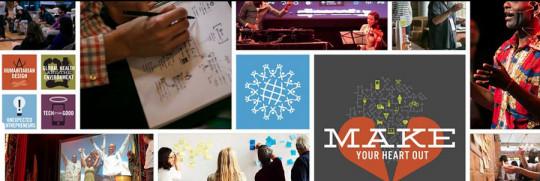Where We Work
See our interactive map


Last month hundreds of participants from around the world met in the artsy community of Saxapahaw, North Carolina, for the fourth annual SwitchPoint conference, produced by IntraHealth International.
This two-day gathering brings together great ideas, tools, and people who are making a real difference in the world in areas such as humanitarian innovation, global health, and technology.
I was honored to attend and speak about innovation curation, ingenuity, and global development, inviting the audience to ponder what innovation means in the context of global health (giving examples from PATH’s 40-year history), where innovation comes from, and how lasting global progress requires cross-sector collaboration to achieve impact at scale.
SwitchPoint is known for challenging participants to stretch their boundaries, comfort zones, and contacts.
With Kennedy Odede, a social entrepreneur and founder of Shining Hope for Communities (located in the slums of Nairobi), I also ran one of the 22 microlabs—small interactive workshops with 30 people—on how stakeholder considerations influence the development and advancement of innovations.
SwitchPoint is known for challenging participants to stretch their boundaries, comfort zones, and contacts. Featured speakers this year covered a broad and interesting spectrum of talks: collecting data using drones—or unmanned aerial vehicles; battling Ebola; 3-D organ printing and crowdsourcings; and bioethics. There were 50 fascinating talks stretched across two packed days.
Three moments at the conference particularly stood out for me:
1) A dinner conversation with Lisa Russell, an Emmy-winning filmmaker who produces film and advocacy campaigns for various UN agencies and nongovernmental organizations, and Neil Brandvold, a freelance photojournalist primarily working in conflict zones—most recently on the front lines of the Ebola epidemic in Liberia and Sierra Leone. Lisa spoke about narrative justice in filmmaking and her passion for reframing stories to show the positive change that people in their own communities can instigate. When we asked Neil, “Why do you do what you do?” he spoke avidly about the importance of being a digital witness to crisis and telling stories through photos for the rest of the world.
2) Alex Kotch, a composer, producer, DJ, and instrumentalist known as Direwolf, was spinning the tunes and setting the stage for cross-sector conversation about future collaborations. Each speaker had his/her own personal musical interlude, specifically chosen to match the topic and presenter. I loved the energy that the music brought and the distinctive vibe it added to an already unique and inspiring conference.
3) I attended a microlab with artists and dancers from Culture Mill, where we participated in several guided actions, using our bodies and our senses as primary vehicles to comprehend intuition, decision-making, and cooperation. These exercises pushed me out of my comfort zone and taught me how much we can accomplish by communicating through movement instead of words.
The two-day event was closed by Pierce Freelon, cofounder of the Beat Making Lab, a program that has partnered with PBS to build music studios in international community centers. Freelon did a live rap on the two-day event, drawing from the words that participants held up on index cards describing their experience.
SwitchPoint is one of those experiences that stays with you for a while. I often find myself thinking back to something I heard from one of the talks, or listening to one of the songs that the DJ played, or recalling a snippet from one of the many interesting conversations that occurred.
I took home with me a jolt of creativity that I’m working to infuse in my day-to-day work and life.
This post originally appeared on the PATH blog.
Get the latest updates from the blog and eNews




